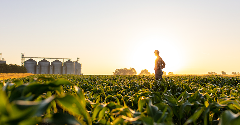News
COP16: How biodiversity loss is driving change to the global food system
18 Oct 2024The food industry is positioned to play a crucial role at the Conference of the Parties (COP) to the Convention on Biological Diversity, known as COP16, which will likely shape the regulatory landscape for years to come.

New commitments made during COP16 are expected to drive further action across the food supply chain, and ingredient companies and food manufacturers that proactively align with biodiversity targets will be better equipped to navigate these changes and seize opportunities in the growing market for sustainable products.
COP16 will take place from 21 October to 1 November in Cali, Colombia. Alongside COP16, Cali will also host the meeting of the parties to the Cartagena Protocol on Biosafety (CP-MOP-11) and the fifth meeting of the parties to the Nagoya Protocol on Access to Genetic Resources and the Fair and Equitable Sharing of the Benefits Arising from their Utilization (NP-MOP-5).
The food industry, one of the key drivers of biodiversity loss, will face increasing scrutiny and pressure to align its practices with the Kunming-Montreal Global Biodiversity Framework (GBF), which was adopted at COP15 in 2022. This framework has set ambitious targets, including the protection of 30% of the world’s land and sea areas by 2030, and will be central to discussions at COP16.
Food systems: The leading driver of biodiversity loss
Food production is responsible for up to 80% of the world’s biodiversity loss and deforestation, according to the United Nations. The expansion of agriculture, unsustainable fishing practices, and land conversion for food production are directly linked to habitat destruction and ecosystem degradation. The global demand for palm oil, soy, meat, and other commodities has driven large-scale deforestation and biodiversity loss, especially in tropical regions such as the Amazon, Southeast Asia, and Central Africa.
The GBF highlights the significant role that food manufacturers and ingredient suppliers play in contributing to biodiversity loss, but also in offering solutions. Several key targets from the framework, such as Target 7 (reducing pollution, including pesticides) and Target 10 (enhancing biodiversity and sustainability in agriculture, aquaculture, fisheries, and forestry), are directly relevant to food systems.
Growing regulatory pressure on food manufacturers
At COP16, discussions will focus on translating the GBF’s targets into enforceable regulations that will impact the food industry. Countries are expected to present their National Biodiversity Strategies and Action Plans, outlining how they will reduce pollution, minimise habitat destruction, and promote sustainable land use in agriculture.
For food manufacturers, this could mean more stringent regulations around deforestation, pesticide use, and water consumption. The European Union’s upcoming (but likely delayed) ban on products linked to deforestation – under the EU Deforestation Regulation (EUDR) – serves as an example of the regulatory shifts expected to accelerate following COP16. These regulations aim to ensure that products imported into the EU do not contribute to biodiversity loss, which could impact suppliers of key ingredients such as soy, palm oil, and cocoa.
Moreover, the Corporate Sustainability and Due Diligence Directive (CSDDD) in Europe is pushing food companies to measure and report their impacts on biodiversity, alongside other environmental metrics like carbon emissions and water usage. And in Japan, regulatory frameworks such as the Taskforce for Nature-Related Financial Disclosures (TNFD) are also encouraging corporate reporting on biodiversity risks.
Corporate action: The role of food and ingredient companies
In the run-up to COP16, major food manufacturers and ingredient companies have already begun to step up their biodiversity commitments. Nestlé, Danone, Unilever, and other large corporations have signed the Business for Nature coalition’s statement, urging governments to adopt more ambitious biodiversity policies. This growing corporate engagement reflects a recognition that biodiversity loss poses long-term risks to supply chains and food security.
The Business for Nature coalition has also called for more regulatory and financial support to aid the transition to regenerative agriculture, a model that aims to rebuild soil health, enhance biodiversity, and increase carbon sequestration. Regenerative practices, such as agroecology, crop diversification, and reduced chemical inputs, are gaining traction among food companies seeking to mitigate their environmental impact.
One of the key areas where food manufacturers can make a significant difference is in reducing the use of pesticides and harmful chemicals. Target 7 of the GBF calls for a 50% reduction in the risk posed by pesticides and highly hazardous chemicals by 2030. Integrated pest management strategies, which focus on minimising chemical use while preserving agricultural productivity, are expected to become more widespread as part of this shift. Food manufacturers are likely to face increasing pressure from both regulators and consumers to source ingredients from suppliers that use such sustainable practices.
Potential industry impacts of biodiversity loss agreements
The consequences of failing to address biodiversity loss are profound. Ecosystem services – such as pollination, water filtration, and climate regulation – are essential to food production. Biodiversity loss threatens the resilience of food systems, which are already vulnerable to climate change and other environmental stressors.
For ingredient suppliers, biodiversity loss could lead to disruptions in the availability of raw materials, higher prices for sustainable commodities, and greater supply chain risks. Companies that do not transition to sustainable sourcing practices may face regulatory penalties, restricted market access, and reputational damage as consumer awareness of biodiversity issues continues to grow.
However, there are also significant opportunities for those that lead the transition toward sustainability. By adopting biodiversity-friendly practices, such as regenerative agriculture and sustainable wild harvesting, food companies can not only reduce their environmental footprint but also differentiate themselves in the marketplace.
Related news

Global consumers enjoy food less and perceive it as less healthy
20 Mar 2025
Enjoyment of food and its perceived healthiness is dwindling among most global populations, according to findings from Gallup and Ando Foundation/Nissin Food Products.
Read more
Seafood set to ‘dethrone’ poultry as protein growth king
19 Mar 2025
Seafood is poised to surpass poultry as the leading contributor to global protein supply growth this year, according to Rabobank’s latest protein outlook.
Read more
Have scientists discovered a new tool to measure UPFs?
19 Feb 2025
Researchers have developed a new scoring system and database, compiling over 50,000 food items, of which over 1,000 are classified as ultra-processed.
Read more
Most consumers lack trust in AI, but supplement users are ready to embrace the technology
14 Feb 2025
A survey of UK and US consumers found that most supplement users are willing to let AI make decisions on their behalf, but they also demand greater transparency.
Read more
Disruptor brands spearhead sustainable solutions
11 Feb 2025
Manufacturers, big and small, sharpen their focus by providing sustainable products and services centred on comprehensive and sustainable approaches to traditional methods.
Read more
RSPO prepares for next stage of sustainable palm oil production
6 Feb 2025
The Roundtable on Sustainable Palm Oil (RSPO), a global standards and governance body, is advocating for stronger regulations and frameworks, and taking action to plug supply chain and traceability interruptions.
Read more
US wins GMO corn trade dispute with Mexico
24 Jan 2025
A Mexican decree banning imports of genetically modified (GM) corn for human consumption has been overturned in what has been hailed as a victory for US exports.
Read more
Kraft Heinz, Mondelēz, Coca-Cola, and Nestlé accused of marketing ‘addictive’ UPFs at children
15 Jan 2025
Major food manufacturers have been hit with a first-of-its-kind lawsuit alleging that they specifically engineer their ultra-processed foods (UPFs) to be addictive, and that they market the products towards children.
Read more
Is it time for a global definition of whole grain?
30 Dec 2024
Amid a lack of harmonisation, the European Food Information Council (EUFIC) is calling for a global definition of the term whole grain to end consumer confusion.
Read more
Coca-Cola waters down environmental targets on packaging, sustainable sourcing
24 Dec 2024
The Coca-Cola Company has changed its targets relating to water, packaging, climate, and agriculture, drawing fire from campaigners.
Read more